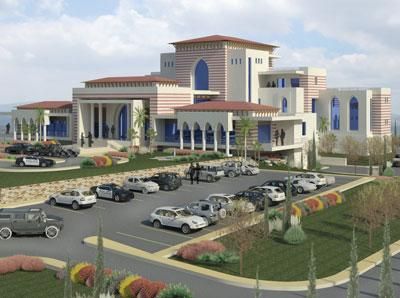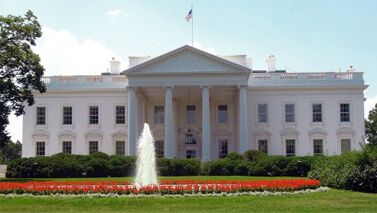It has now been publicly unveiled that Palestinian Authority President Mahmoud Abbas will have a new residence and office, a grand palace that will take several years to build and will be located in Ramallah. Many media accounts, including Newsweek, make note of the fact that with the Palestinian economy in shambles and most Palestinians living in dire poverty, the timing and style of Abbas’ proposed opulent palace could not be worse. For example:
The United Nations Relief and Works Agency (UNRWA), which works with Palestinian refugees, is also facing what is has described as its “most severe financial crisis ever.” UNRWA is appealing for $100 million to begin the 2015-2016 academic yearif this amount is not raised, some 500,000 Palestinian children may not be able to attend school. According to the CIA World Factbook, the West Bank’s GDP per capita stands at $4,900, compared to $33,400 in Israel and $54,800 in the United States.
The article includes an artist rendering of what the new structure will look like:
It is important for the world to be made aware of this extravagance and media who published the story deserve credit. However, the final sentence of the Newsweek article is very troubling:
However, the cost of the palace is dwarfed by that being spent on the construction of a new combined residence and office in Jerusalem for the Israeli prime minister, Benjamin Netanyahu. The project, approved by the Israeli government in May 2014, is estimated to cost $188 million.
It’s a false comparison. Newsweek does not mention the costs of similar structures in modern states. But more to the point, Israel is not in the midst of an economic collapse, unable to see to the basic needs of its residents.
Not only is the Palestinian economy in free fall, the massive amounts of foreign aid given to the PA have been wasted due to widespread corruption. According to Palestinian journalist Khaled Abu Toameh (speaking after a delegation of U.S. Congressman visited the PA):
Of course, the Palestinian Authority prime minister did not tell the visiting U.S. Congressmen that the $4.5 billion the Americans invested in promoting Palestinian democracy went down the drain or ended up in secret Swiss bank accounts.
In contrast, the proposal for the Israeli complex was developed by a public committee and approved by the government.
In giving a green light to the projects, the government ministers approved a plan drafted by a specially appointed public committee which, in December 2013, was tasked with investigating the cost effectiveness of investing in a new airplane and residence for the prime minister.
In a report last month the committee noted the many logistical problems associated with the lack of an official, dedicated aircraft for state visits as well as with the current prime minister’s residence, which is not located near the prime minister’s office.
In other words, the plan is based on being more cost-efficient than the current situation in which the Prime Minister’s residence and office are not adjacent. Of course, the Israeli prime minister is an elected position so it would be false to describe the new building as being for the benefit of Benjamin Netanyahu. There could very well be a new prime minister by the time construction is complete. Not so for Mahmoud Abbas, still in power more than five years after the end of his term with no prospect of elections in sight.
Here’s another building that combines the residence and office of a nation’s leader. It’s a shame Newsweek didn’t reference its cost either.



